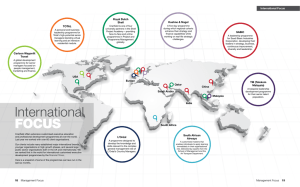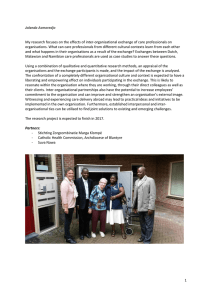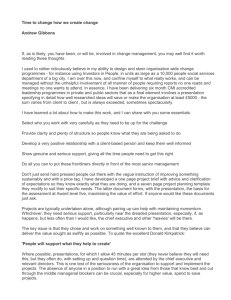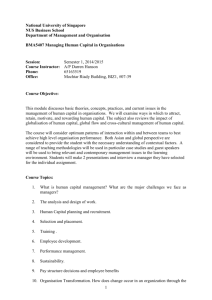The Long and the Short of Executive Development
advertisement
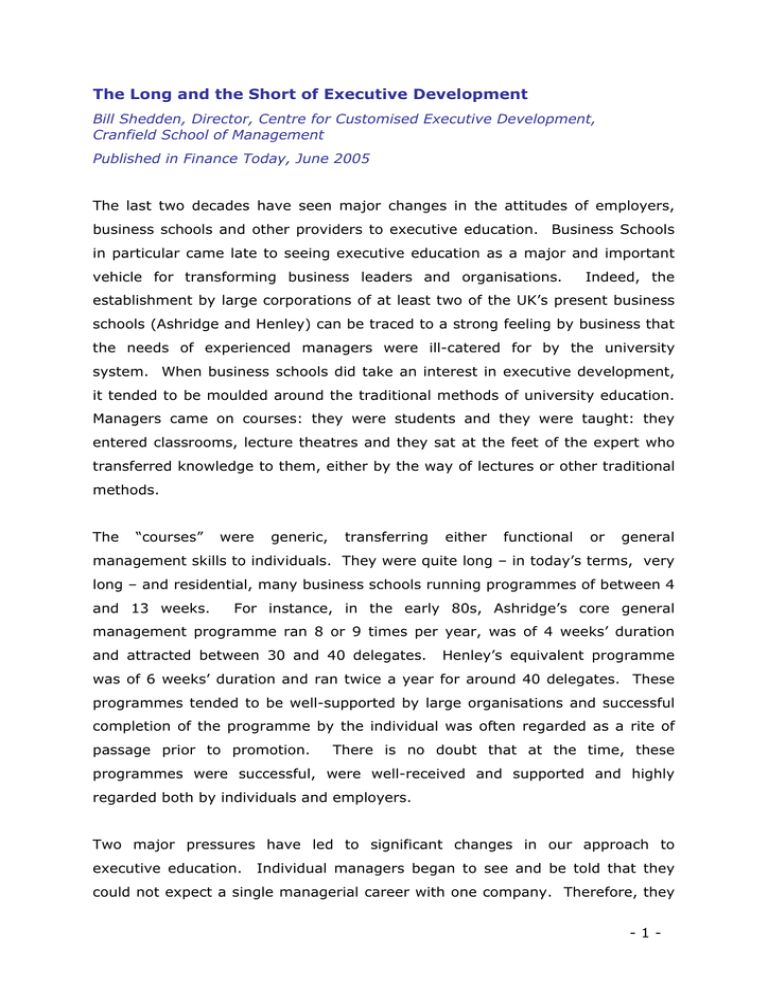
The Long and the Short of Executive Development Bill Shedden, Director, Centre for Customised Executive Development, Cranfield School of Management Published in Finance Today, June 2005 The last two decades have seen major changes in the attitudes of employers, business schools and other providers to executive education. Business Schools in particular came late to seeing executive education as a major and important vehicle for transforming business leaders and organisations. Indeed, the establishment by large corporations of at least two of the UK’s present business schools (Ashridge and Henley) can be traced to a strong feeling by business that the needs of experienced managers were ill-catered for by the university system. When business schools did take an interest in executive development, it tended to be moulded around the traditional methods of university education. Managers came on courses: they were students and they were taught: they entered classrooms, lecture theatres and they sat at the feet of the expert who transferred knowledge to them, either by the way of lectures or other traditional methods. The “courses” were generic, transferring either functional or general management skills to individuals. They were quite long – in today’s terms, very long – and residential, many business schools running programmes of between 4 and 13 weeks. For instance, in the early 80s, Ashridge’s core general management programme ran 8 or 9 times per year, was of 4 weeks’ duration and attracted between 30 and 40 delegates. Henley’s equivalent programme was of 6 weeks’ duration and ran twice a year for around 40 delegates. These programmes tended to be well-supported by large organisations and successful completion of the programme by the individual was often regarded as a rite of passage prior to promotion. There is no doubt that at the time, these programmes were successful, were well-received and supported and highly regarded both by individuals and employers. Two major pressures have led to significant changes in our approach to executive education. Individual managers began to see and be told that they could not expect a single managerial career with one company. Therefore, they -1- needed to equip themselves, at an individual level, both for change and to give themselves a competitive advantage in the market place. At the same time employers began to ask questions of the approach, cost benefits and outcomes of the traditional programmes run by business schools. Individuals began to enrol on (MBA) programmes and their rapid growth significantly accelerated the changes that took place in our executive education system. In 1985 there were 20 business schools in the UK offering an MBA. Now there are 120 offering MBAs and they can be completed full-time, parttime, modular, evening, by distance learning, in consortiums and, in some cases, for single companies. The question for budding managers now is not have you got an MBA but where did you get it from? The rapid growth of university education has been replicated in the MBA world. However, although employers still mainly support MBAs in their recruitment processes, they are less willing to support students financially and at the same time have become much more proactive in what they expect of their own organisation’s approach to executive development. The long of it, and the single club approach to executive development has now gone. “The short of it” is that executive development now has a different vocabulary to the one of twenty years ago. Individual development is still clearly important but there now has to be an organisation pay off, either through the development of new strategic capital for the organisation or through the implementation of a significant organisation change. Whilst teaching skills might still be important, of even greater value is ensuring that the participants learn, develop and implement. Organisations now expect providers to deliver more than programmes - they expect sustainable results. To that end, they may want a programme but they also want it to be customised to the needs of the individual and the organisation. Public programmes have to show they meet specific individual needs. The days of the long, generic programme are essentially past. The successful Cranfield portfolio of general management programmes has survived and grown because of their ability to focus on individual needs at key career moments and issues of strategic significance for business. -2- There is a growing requirement in many organisations for a customised intervention to meet a range of needs and delivered in a way and in venues to meet the requirements of the organisation and delivered possibly in partnership with other business schools and other providers. At Cranfield there are two core principles to any intervention process we take part in. Both of these principles are critical to providing programmes that are suited to the particular culture and needs of our clients. We seek, in our approach to network learning, to exploit the opportunities afforded by both education and social networks to develop individuals and organisations. We therefore insist on providing the most relevant and up-to-date research and practical experiences for our clients. This involves creating programmes and other interventions that use not just Cranfield’s faculty and consultancy skills, but a range of associates and institutions from all over the world. The second principle is that Cranfield is committed to blended learning, that is, utilising and pioneering a range of learning techniques to provide different delivery methods that not only suite an array of individual learning needs, but are able to adapt to any form of organisational constraint. Clearly, this also involves the use of an on-line facility. Today’s provider of executive development has to be able to meet an organisation’s need for a range of HR development interventions and a range of delivery mechanisms. In addition, it has to provide a service that traditionally was provided by other consultancies. Organisations are no longer prepared to simply allow providers of executive development to run programmes and justify their existence on the success of a programme. Our clients at Cranfield make us justify our existence on our ability to help them not only develop their individual managers but also their organisations. They may want a relationship based on their own corporate university where not only access to programmes becomes important, but access to faculty, to research and consultancy interventions is required. They may want assistance in a highly focused time frame to help them deliver an organisational change and this time frame will usually include not just a development programme, but also significant organisation-based consultancy on the implementation process. Therefore, the best business schools have to be -3- able to provide professional key account management, a faculty that is not only able to deliver expertise, but also to be able to facilitate, challenge organisations and coach individuals. The best business schools are equipping themselves organisationally and culturally to deal with these major challenges. The short of it is that if providers develop new methodologies to supplement and, as appropriate, replace the traditional programme, we can bring about major and exciting practical results both for individuals and organisations. We have to develop a “multi-club” approach to development, engaging with our clients in the totality of the human resource development and organisational development process from diagnosis to implementation. Here at Cranfield, 50% of our customised executive development business is generated in nontraditional ways and in venues or in client organisations away from our main site, either in the UK or overseas. Figure 1 shows the diversity of the approaches required to be a successful executive development provider. Blended Learning - Community Learning Content i.e. knowledge shortfalls and updates Faculty Expertise Networking Action learning Sets E-Learning Resource Databases Virtual Discussion Fora Projects Materials & Tools Syndicate Discussions Learning Context • Consultancy • Webcasts • Business Simulations • Coaching • Implementation consultancy Blended Learning: “The application of a range of learning content within the context of the organisation” 11 February 2005 Centre for Customised Executive Development Page 1 Fig 1: In short, blended learning and development is what the first division of suppliers now offer. Therefore organisations or individuals when choosing a qualifications programme or an executive development programme should thoroughly check the business school’s ability to deliver the results required in the most focused, relevant and effective way for the organisation. -4-
